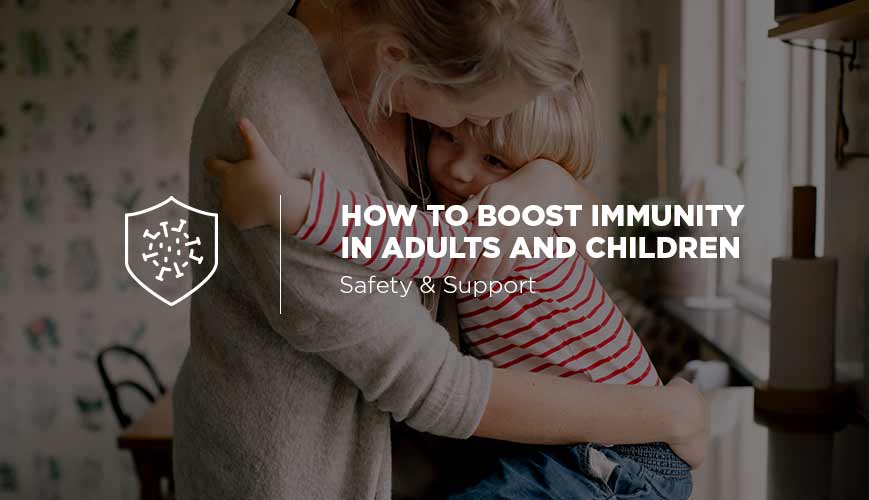How to Boost Immunity in Adults and Children
By Martha Michael

For most people, the body is a machine that fights infection and keeps things under control on a regular basis. When germs attack your physical health, your immune system fights back to return you to a state of wellness.
One of the best decisions you can make to successfully resist the onslaught of illness is adequate preparation. Building a stronger immune system is the way to do that.
An article by Harvard Health Publishing describes a list of behaviors that help you fight infection by strengthening your immune system. They include:
- Get enough sleep
- Wash your hands
- Get a moderate level of exercise
- Maintain a healthy weight
- Don't drink too much alcohol
- Don't smoke
Some of these suggestions may be top priorities for you already, such as drinking less or not smoking. But other choices warrant reminders to move them to the top of your list.
Washing Hands
As people across the globe have learned, the use of antibacterial sprays, disinfectant wipes, and good old-fashioned soap and water can go the distance in protecting you from various pathogens. An article by PR News Wire a few years ago discussed data about the cleaning habits of Americans. Researchers for Karcher, a cleaning technology company, found that more than 80 percent of those surveyed believe it’s important to have a clean house. But just 43 percent of them actually clean their homes regularly before the appearance becomes dirty and the need becomes obvious.
Where personal hygiene is concerned, an article by humanitarian charity Unicef ranks handwashing the highest among basic hygiene behaviors contributing to good health. But unfortunately, the article says, a study of 78 countries by the nonprofit organization reveals that “current levels of hand washing with soap are generally low.” Some of the countries reported between 0 and 25 percent of houses had basic hand washing facilities. That’s not a good sign during a pandemic.
Exercise
It may seem like an indirect contribution to your immune system, but it’s possible that exercise is more than just a cog in the overall wheel of general wellness.
“It may contribute even more directly by promoting good circulation, which allows the cells and substances of the immune system to move through the body freely and do their job efficiently,” says the Harvard Health article.
Researchers haven’t found a direct causal connection between exercise and your ability to fight infection, but experts point out that moderate exercise is an important factor in maintaining a healthy lifestyle, so it’s reasonable to believe that you’re boosting your immune system as well.
Sleep
It’s not a guaranteed mechanism for illness prevention but getting enough sleep can minimize your risk of getting a cold or the flu. Sleep deprivation adversely affects your immune system, according to an article by the Sleep Foundation.
Proteins known as cytokines create an immune response by targeting inflammation and infection. But when you sleep fewer than the recommended seven to eight hours per night, you create and release fewer cytokines, so you’re less protected from threats to your health.
Sleep deprivation can also reduce the effectiveness of the flu vaccine, which is why you should try to get enough shut-eye during flu season, some experts say.
Helping Children Boost Their Immunity
Most parents would like to reduce the number of days their kids are sick. An article in Parents Magazine says you can achieve that goal by taking steps that boost the immunities of children.
Breastfeeding
You can impact your child’s immune system from infancy by choosing to breastfeed over feeding them formula. Babies benefit most from breastfeeding because the milk contains antibodies and white blood cells. By choosing to breastfeed you may be able to minimize conditions that include diarrhea, pneumonia, allergies, urinary tract infections, meningitis and sudden infant death syndrome.
More Sleep
Sleep deprivation is an enemy to healthy living -- for adults and children, in part because sleeping promotes production of “natural killer cells” that attack microbes and cancer cells.
A child’s circumstances play a part in the risks, says Kathi Kemper, MD, director of the Center for Holistic Pediatric Education and Research at Children's Hospital, in Boston: “Kids in daycare have a greater risk of getting less sleep than those at home because it’s harder to nap amid that level of activity.”
Infants need up to 16 hours of sleep, toddlers need 11 to 14 hours per day, and preschool-aged children need approximately 10 to 13 hours. For kids who resist napping, the article suggests making their bedtimes earlier.
Reduce Spread of Germs
Most parents know how important it is to wash hands frequently when living with children, but kids need to be made aware that certain practices reduce the chance they will get sick. Remind them to wash their hands after playing with pets, going to the bathroom, and blowing their nose. Another preventative measure is to throw away toothbrushes after recovering from an illness.
Teaching your children best practices and keeping your own body a well-oiled machine entails a balance of healthy behaviors. Your decisions can boost your immune system, provide you with more ammunition to defeat invading pathogens, and help you to stay healthy.
The information, including but not limited to, text, graphics, images and other material contained on this page are for informational purposes only. The purpose of this post is to promote broad consumer understanding and knowledge of various health topics, including but not limited to the benefits of chiropractic care, exercise and nutrition. It is not intended to provide or be a substitute for professional medical advice, diagnosis or treatment. Always seek the advice of your chiropractor, physician or other qualified health care provider with any questions you may have regarding a medical condition or treatment and before undertaking a new health care regimen, and never disregard professional medical advice or delay in seeking it because of something you have read on this page.